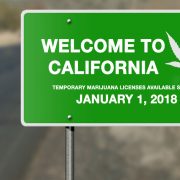Attention California Cannabis Distributors: First Quarter 2018 Cannabis Tax Return Is Due April 30, 2018
/0 Comments/in California Marijuana Licensing, California State Taxes, Marijuana Tax Planning & Marijuana Tax Defense/by Tax AttorneyCalifornia’s Cannabis Cultivation Tax – It’s How The State Gets Its Cut After The Harvest
/0 Comments/in California Marijuana Licensing, Marijuana Tax Planning & Marijuana Tax Defense/by Tax AttorneyHow California Cannabis Retailers Compute And Pay Taxes For Cannabis Acquired Before January 1, 2018 That Is Being Sold Now
/0 Comments/in California Marijuana Licensing, California State Taxes, Marijuana Tax Planning & Marijuana Tax Defense/by Tax AttorneyNew cannabis taxes have been in effect in California starting January 1, 2018. Beginning January 1, 2018, licensed distributors who supply you with cannabis or cannabis products are required to calculate and collect the 15% cannabis excise tax from you. When you sell those items at retail you are required to collect the cannabis excise tax from your customer. But what are your excise tax obligations for cannabis acquired before January 1, 2018 and sold after December 31, 2017?
The administration and enforcement of the cannabis taxes is under the authority of California Department Of Tax And Fee Administration (“CDTFA”).
For sales of cannabis from your inventory acquired prior to January 1, 2018… you are required to collect the 15% cannabis excise tax from your customer when you sell those items and then pay that amount to a licensed distributor with whom you have established a business relationship.
To collect the excise tax from your customers, apply the 15% excise tax to the “average market price”.
The average market price can be calculated as either:
- Your gross receipts, which is the retail selling price to your customer, or
- Your wholesale cost plus a markup determined by CDTFA.
The examples below illustrate the two methods to calculate the average market price and apply the 15% excise tax on your sale to your customer. Both examples assume that your retail selling price to your customer is $100 and the sales tax rate is 8% (your actual sales tax rate may be different):
Option #1 Based on your gross receipts.
| Retail selling price |
$100.00 |
|
| 15% excise tax ($100 x 15%) |
$15.00 |
|
| Total gross receipts ($100 + $15) |
$115.00 |
|
| 8% sales tax ($115 x 8%) |
$9.20 |
|
| Total amount due ($115 + $9.20) |
$124.20 |
You must pay the $15.00 excise tax collected from your customer to a licensed distributor with whom you have a business relationship. The sales tax is due on your total gross receipts, which includes the excise tax. You must report and pay the $9.20 in sales tax on the quarterly sales and use tax return you file with the CDTFA.
Option # 2 Based on your wholesale cost plus a markup predetermined by the CDTFA.
The markup rate percentage is currently set at 60% and is not meant to be used to determine the markup on your product that you sell to your customers. This markup rate is determined by the CDTFA every six months.
| Your wholesale cost |
$75.00 |
|
| 60% current markup ($75 x 60%) |
$45.00 |
|
| Average market price ($75 + $45) |
$120.00 |
|
| 15% Excise tax due ($120 x 15%) |
$18.00 |
You must pay the $18.00 excise tax collected from your customer to a licensed distributor with whom you have a business relationship.
The sales tax is a separate computation as follows:
| Retail selling price, including excise tax ($100 + $18) |
$118.00 |
|
| 8% sales tax ($118 x 8%) |
$9.44 |
|
| Total amount due |
$127.44 |
The sales tax is due on your total gross receipts, which includes the excise tax. You must report and pay the $9.44 in sales tax on your quarterly sales and use tax return you file with the CDTFA.
Required Statement To Include When Invoicing Your Customers.
When invoicing your customer, you are required to add the following statement on the invoice or receipt to your customer: “The excise taxes are included in the total amount of this invoice”.
Payment Of The Excise Tax Must Be To A Licensed Cannabis Distributor.
Regardless of which option you choose, you must pay the excise tax you collect to a licensed cannabis distributor by the 15th day of the month following the calendar month you collected the excise tax from your customer. Make sure you receive a receipt from the licensed distributor showing the amount of excise tax you collected and paid to the licensed distributor.
What Should You Do?
It is enough that cannabis businesses have to deal with the uncertainty of the Federal government in enforcing the Federal law that makes it a crime to possess and sell cannabis. Make sure that your cannabis business is in compliance with California Cannabis Taxes by engaging the tax attorneys at the Law Offices Of Jeffrey B. Kahn, P.C. located in Orange County (Irvine), Inland Empire (Ontario) and other California locations. We can come up with solutions and strategies to these challenges and protect you and your business to maximize your net profits.
Adding To The Turmoil For The Marijuana Industry – Federal District Attorney For Southern District Of California Endorses Attorney General Sessions’ Revocation Of The Cole Memo
/0 Comments/in California Marijuana Licensing, Marijuana Tax Planning & Marijuana Tax Defense/by Tax AttorneyOn January 4, 2018, U.S. Attorney General Jeff Sessions announced the revocation of what is known in the cannabis industry as the “Cole Memo”.
It is surprising that the Trump Administration known for its pro-business stance, allowed for such an anti-business decision to be made by Attorney General Sessions. Just in California alone with the change in law allowing both medical and recreational marijuana, the marijuana industry in California is expected to be a $3.7 billion market in 2018 and could rise to $5.1 billion in 2019 according to the cannabis industry research firm BDS Analytics.
Medical marijuana is now legal in 29 states plus the District Of Columbia and recreational marijuana is legal in 8 states plus the District Of Columbia. However, under Federal law marijuana is designated as a Schedule I controlled substance and therefore is illegal under Federal law.
United States Attorney’s Office for the Southern District of California Is The First Office In California To Officially Announce It Will Not Follow The Cole Memo
There are four federal districts in California with each district headed by a chief federal prosecutor. The office of the Federal Southern District Of California which covers San Diego is the only one so far issuing an official statement. So while federal prosecutors in States like Colorado stated that they won’t change their approach to prosecuting marijuana crimes, federal prosecutor, Adam Braverman, announced that the office of the Federal Southern District Of California is committed to enforcing the laws enacted by Congress, which treats marijuana as an illegal controlled substance. He goes on in his written statement that “The Department of Justice is committed to reducing violent crime and enforcing the laws as enacted by Congress. The cultivation, distribution, and possession of marijuana has long been and remains a violation of federal law. We will continue to utilize long-established prosecutorial priorities to carry out our mission to combat violent crime, disrupt and dismantle transnational criminal organizations, and stem the rising tide of the drug crisis.”
What Is The Cole Memo?
The Cole Memo which came out of the Department Of Justice (“DOJ”) under the Obama administration in 2013, directed U.S. Attorneys to use discretion to prioritize certain types of violations in prosecuting cannabis operators, but, strictly speaking, it did not make operations in cannabis legal. The DOJ told its prosecutors that prosecuting medical marijuana cases in states where is has been legalized would no longer be a priority.
The Cole Memo included eight factors for prosecutors to look at in deciding whether to charge a medical marijuana business with violating the Federal law:
- Does the business allow minors to gain access to marijuana?
- Is revenue from the business funding criminal activities or gangs?
- Is the marijuana being diverted to other states?
- Is the legitimate medical marijuana business being used as a cover or pretext for the traffic of other drugs or other criminal enterprises?
- Are violence or firearms being used in the cultivation and distribution of marijuana?
- Does the business contribute to drugged driving or other adverse public health issues?
- Is marijuana being grown on public lands or in a way that jeopardizes the environment or public safety?
- Is marijuana being used on federal property?
What This Means For Marijuana Businesses
Hopefully the federal prosecutors in the Southern District of California will change its stance and follow the same position as other federal prosecutors like in the State of Colorado in reaffirming a commitment to prioritizing violent and other serious federal crimes. Look to us for future updates on this.
What Should You Do?
Given the greater disparity in treatment between the Federal and California governments you need to protect yourself and your marijuana business from all challenges created by the Federal government. Be proactive and engage an experienced attorney-CPA in your area. Let the tax attorneys of the Law Offices Of Jeffrey B. Kahn, P.C. located in Orange County (Irvine), San Diego County (Carlsbad) and other California locations protect you and maximize your net profits.
Big Win For The Marijuana Industry – Colorado District Attorney’s Office Rebuffs Attorney General Sessions’ Revocation Of The Cole Memo
/0 Comments/in California Marijuana Licensing, Marijuana Tax Planning & Marijuana Tax Defense/by Tax AttorneyOn January 4, 2018, U.S. Attorney General Jeff Sessions announced the revocation of what is known in the cannabis industry as the “Cole Memo”.
It is surprising that the Trump Administration known for its pro-business stance, allowed for such an anti-business decision to be made by Attorney General Sessions. Just in California alone with the change in law allowing both medical and recreational marijuana, the marijuana industry in California is expected to be a $3.7 billion market in 2018 and could rise to $5.1 billion in 2019 according to the cannabis industry research firm BDS Analytics.
Medical marijuana is now legal in 29 states plus the District Of Columbia and recreational marijuana is legal in 8 states plus the District Of Columbia. However, under Federal law marijuana is designated as a Schedule I controlled substance and therefore is illegal under Federal law.
Colorado DA’s Office First To Officially Announce Continued Support Of The Cole Memo
The State Of Colorado legalized recreational marijuana in 2012. It is big business in Colorado so it is not a surprise that the Federal District Attorney’s Office in that state was quick with its announcement stating “The Attorney General rescinded the Cole Memo on marijuana prosecutions, and directed that federal marijuana prosecution decisions be governed by the same principles that have long governed all of our prosecution decisions. The United States Attorney’s Office in Colorado has already been guided by these principles in marijuana prosecutions — focusing in particular on identifying and prosecuting those who create the greatest safety threats to our communities around the state. We will, consistent with the Attorney General’s latest guidance, continue to take this approach in all of our work with our law enforcement partners throughout Colorado.”
What Is The Cole Memo?
The Cole Memo which came out of the Department Of Justice (“DOJ”) under the Obama administration in 2013, directed U.S. Attorneys to use discretion to prioritize certain types of violations in prosecuting cannabis operators, but, strictly speaking, it did not make operations in cannabis legal. The DOJ told its prosecutors that prosecuting medical marijuana cases in states where is has been legalized would no longer be a priority.
The Cole Memo included eight factors for prosecutors to look at in deciding whether to charge a medical marijuana business with violating the Federal law:
- Does the business allow minors to gain access to marijuana?
- Is revenue from the business funding criminal activities or gangs?
- Is the marijuana being diverted to other states?
- Is the legitimate medical marijuana business being used as a cover or pretext for the traffic of other drugs or other criminal enterprises?
- Are violence or firearms being used in the cultivation and distribution of marijuana?
- Does the business contribute to drugged driving or other adverse public health issues?
- Is marijuana being grown on public lands or in a way that jeopardizes the environment or public safety?
- Is marijuana being used on federal property?
What This Means For Marijuana Businesses
Hopefully other U.S. district attorney office’s will follow the same stance as the U.S. Attorney for Colorado in reaffirming a commitment to prioritizing violent and other serious federal crimes. As of this writing none of the four Federal district attorney offices in California have yet made any statement on whether they will still apply the Cole Memo. Look to us for future updates on this.
What Should You Do?
Given the greater disparity in treatment between the Federal and California governments you need to protect yourself and your marijuana business from all challenges created by the Federal government. Be proactive and engage an experienced attorney-CPA in your area. Let the tax attorneys of the Law Offices Of Jeffrey B. Kahn, P.C. located in Orange County (Irvine), Long Beach and other California locations protect you and maximize your net profits.
Attorney General Jeff Sessions Takes On The Marijuana Industry
/0 Comments/in California Marijuana Licensing, Marijuana Tax Planning & Marijuana Tax Defense/by Tax AttorneyAttorney General Jeff Sessions Takes On The Marijuana Industry
On January 4, 2018, U.S. Attorney General Jeff Sessions announced the revocation of what is known in the cannabis industry as the “Cole Memo”.
It is surprising that the Trump Administration known for its pro-business stance, allowed for such an anti-business decision to be made by Attorney General Jeff Sessions. Just in California alone with the change in law allowing both medical and recreational marijuana, the marijuana industry in California is expected to be a $3.7 billion market in 2018 and could rise to $5.1 billion in 2019 according to the cannabis industry research firm BDS Analytics.
Medical marijuana is now legal in 29 states plus the District Of Columbia and recreational marijuana is legal in 8 states plus the District Of Columbia. However, under Federal law marijuana is designated as a Schedule I controlled substance and therefore is illegal under Federal law.
The Cole Memo which came out of the Department Of Justice (“DOJ”) under the Obama administration in 2013, directed U.S. Attorneys to use discretion to prioritize certain types of violations in prosecuting cannabis operators, but, strictly speaking, it did not make operations in cannabis legal. The DOJ told its prosecutors that prosecuting medical marijuana cases in states where is has been legalized would no longer be a priority.
The Cole Memo included eight factors for prosecutors to look at in deciding whether to charge a medical marijuana business with violating the Federal law:
- Does the business allow minors to gain access to marijuana?
- Is revenue from the business funding criminal activities or gangs?
- Is the marijuana being diverted to other states?
- Is the legitimate medical marijuana business being used as a cover or pretext for the traffic of other drugs or other criminal enterprises?
- Are violence or firearms being used in the cultivation and distribution of marijuana?
- Does the business contribute to drugged driving or other adverse public health issues?
- Is marijuana being grown on public lands or in a way that jeopardizes the environment or public safety?
- Is marijuana being used on federal property?
Under Sessions’ new guidance, the Cole Memo is overridden and U.S. Attorneys now retain broad prosecutorial discretion as to whether to prosecute cannabis businesses under federal law even though the state that these businesses operate in have legalized some form of marijuana. Although the safe harbor guidelines are no longer in place at a national level, that does not mean that your local federal prosecutor will disregard their continued application in determining whether federal prosecution against a local marijuana business should be implemented. But this is no guarantee so it is essential that you have legal counsel to back you up.
What Should You Do?
Given the greater disparity in treatment between the Federal and California governments you need to protect yourself and your marijuana business from all challenges created by the Federal government. Be proactive and engage an experienced attorney-CPA in your area. Let the tax attorneys of the Law Offices Of Jeffrey B. Kahn, P.C. located in Orange County, Long Beach and other California locations protect you and maximize your net profits.
California Cannabis Businesses Must Follow New Invoicing And Tax Rules
/0 Comments/in California Marijuana Licensing/by Tax AttorneyCalifornia Opens Its Marketplace To Marijuana Businesses In 2018
/0 Comments/in California Marijuana Licensing/by Tax AttorneyKeep In Touch
MEET US IN PERSON
Services
- Abatement of Tax Penalties
- Audits And Tax Court
- Business Transactions
- Cannabis / Marijuana Tax Services
- Criminal Tax Investigations
- Crypto-currency / Bitcoin – Tax Representation Services
- Currently Not Collectible
- Delinquent Tax Returns
- Employment And Payroll Taxes
- Entity Formations
- Estate Planning
- Estate Planning For Non US Citizens
- Estate Tax Planning
- FATCA | Foreign Account Reporting Compliance
- FBAR | Foreign Bank Account Reporting
- Full Pay Service
- Income Tax Planning
- Innocent Spouse Claims
- IRS & State Tax Controversies
- IRS Offshore Tax Investigations
- IRS Offshore Tax Investigations
- IRS State Tax Controversies
- Offers In Compromise
- Payment Agreements
- Representation Of Tax Preparers And Other Tax Professionals
- Revenue Officer Assistance
- Tax & Estate Plannng
- Tax Liens And Levies
- Wage Garnishment









 Follow
Follow Follow
Follow